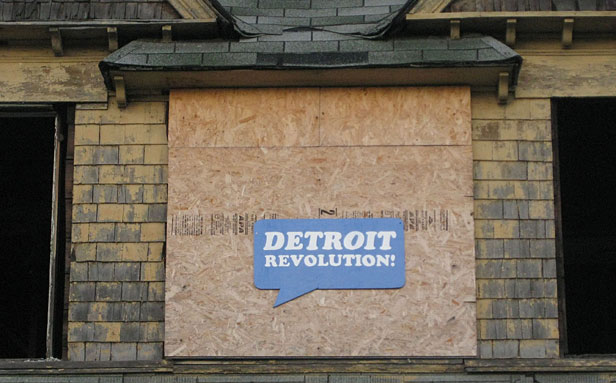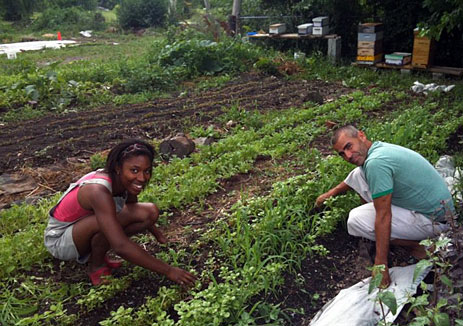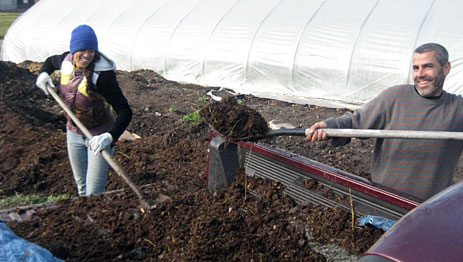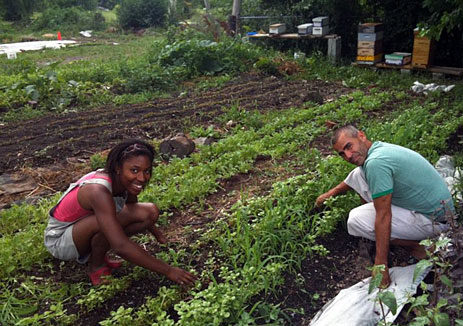 Photos: Natasha Bowens
Photos: Natasha Bowens
The Color of Food series is about my experiences searching for black and Latino farmers in the sustainable food movement.
From what I’d been hearing about Detroit all year, when my train rolled into the station I was expecting to walk out onto a scene from I Am Legend.
However, I quickly discovered that the grapevine had given me nothing but over-exaggerated rumors.
Of course there are parts of the city that have seen their fair share of neglect, but this city, in my opinion, is anything but abandoned. I think what you see in Detroit depends on the way you look at it. I’m not talking about a “make lemonade out of lemons” kind of perspective, I’m talking about really lifting up the skin of Detroit and seeing the flow of radical action and creative energy keeping it alive.
Inner conflict
On my second day in the city I got to tap into that energy firsthand. I was invited to attend a discussion on dismantling racism in the food system by a group some consider to be radical, but I consider to be a strong inspiration.
Throughout my journey I have found that white folks still fill most of the paid jobs at many food justice organizations and even urban farms that promote and support farmers of color. What does that matter? Some say it doesn’t.
The Detroit Black Community Food Security Network (DBCFSN) sprouted up in 2006 out of the need to address food insecurity in Detroit’s Black community and ensure that the majority African-American population was represented in the leadership of efforts to foster food justice and food security. Discussions about the Detroit food system and its long history of racism had been circulating among this group and other food activists, such as Lisa Richter of Earthworks Urban Farm, for years; and from those discussions, the monthly Undoing Racism in the Detroit Food System meetings began.
Many of the participants in the discussion were white and female, which parallels the majority demographic in the food movement. So I was instantly impressed with how they were handling the complex task of discussing our systemically racist agricultural history and unjust food-access system while staring the blunt truth of who dominates the jobs in this movement in the face.
Throughout my journey I have found that white folks still fill most of the paid jobs at many food justice organizations and even urban farms that promote and support farmers of color. What does that matter? Some say it doesn’t, as long as the intention to get the work done is there. Others argue that the black community should be leading the fight. I stand somewhere in the middle. (Go figure.)
As I was sitting in the Undoing Racism meeting in Detroit, I couldn’t help but feel that very issue lingering around the room and within myself. As someone who hopes to inspire more young brown people to engage in agriculture and to work toward just food systems in inner-city areas — but who was raised in the suburbs by a white mother — I sometimes have this nagging feeling that I am not the one should be pursuing such work. I wondered if the white activists and farmers in the room felt the same way.
Charity Hicks, one of the leaders of DBCFSN, raised the issue of white or upper-class privilege when she heard my story of being able to quit my job and travel the country on this farming journey. Her point was to make people in the room aware of the fact that most of the communities feeling the impact of our broken food system don’t have the same privilege to do what I, and others like me, are doing.
But while I agree that participants of the progressive food movement need to recognize and be aware of their privileges and differences when they enter a disadvantaged community to work, I also don’t think the answer is to split the movement and make white or “privileged” farmers and activists feel their help is unwanted by the minority and low-income communities they are working in.
That’s why I think we can all learn from the Undoing Racism in the Detroit Food System group, because they’re raising awareness about these and other race issues within the movement and are working together to break them down.
Composting community
Detroit’s food activists and farmers really showed me how radical, creative collaboration can accomplish big things. They’re determined to be self-sufficient and take community issues into their own hands.
For example, a year ago the DBCFSN took part in starting the city’s first Food Policy Council, which is now in the midst of planning a local-food summit for Spring 2011. And on a super grassroots level, some local residents, John Koller and Hannah Lewis, started hosting Soup at Spaulding, a gathering where community members pay $5 for a soup dinner made by Hannah and listen to proposed projects in the community (such as building a greenhouse, supporting local artists, or funding a neighbor to start a pickling business) and then vote on their favorite. The week’s winning project gets the proceeds of the dinner. This is the kind of community-driven action we need more of.
Others I’m less sure about. There’s a lot of media buzz about Hantz Farms, a 1,000-acre urban farm proposed for Detroit — but who will control all that food production? Likewise, the well-funded nonprofit Urban Farming has a mission to end hunger by planting gardens, but why then are so many of their gardens sitting empty?
 Greg Willerer and Olivia Hubert of Brother Nature Produce.I was lucky enough to stay with a truly community-minded radical on his backyard farm near downtown Detroit. Greg Willerer and his fiance, Olivia Hubert, run Brother Nature Produce, a for-profit market-farm/business that grows and sells its main crop of salad greens at the Wayne State Farmer’s Market and the historic Eastern Market. [Tom Philpott also wrote about Brother Nature and the Detroit urban farming scene for Grist’s Feeding the City series.]
Greg Willerer and Olivia Hubert of Brother Nature Produce.I was lucky enough to stay with a truly community-minded radical on his backyard farm near downtown Detroit. Greg Willerer and his fiance, Olivia Hubert, run Brother Nature Produce, a for-profit market-farm/business that grows and sells its main crop of salad greens at the Wayne State Farmer’s Market and the historic Eastern Market. [Tom Philpott also wrote about Brother Nature and the Detroit urban farming scene for Grist’s Feeding the City series.]
Like many farmers these days, that’s not all they do; they also partner with another local farmer to run the city’s only Community Supported Agriculture program, and they’re in the midst of planning a flower farm and a large-scale compost operation for next season.
“I’m all about supporting other farmers in Detroit,” says Greg, “and this compost operation could supply and outfit the next sets of market gardens and farms in the city.”
Greg, like many other Detroit entrepreneurs, dreams big. “Backyard gardening is great, but its too safe,” he says. “If we’re goi
ng to change our food system we have to go bigger. [In Detroit] we need to decolonize ourselves from the suburbs and produce food on our own. And to do that, we need to be curing our own compost. The hardest part of urban farming is getting compost; it’s expensive and you have to pay a delivery fee to get it trucked in. So this [compost project] would essentially take care of the hardest part of farming in the city. And since we have an abundance of garbage and an abundance of land, along with this horrible economic situation, it’d be stupid not to do it ourselves.”
 Helping Greg turn the compost.During the two weeks I spent on Greg & Olivia’s farm, our work consisted of preparing the compost windrows on a vacant lot extending off their land. The key to good compost is having the right proportion of browns and greens, and Greg works with the local brewery and landscape companies to get vital browns: grain and dead leaves.
Helping Greg turn the compost.During the two weeks I spent on Greg & Olivia’s farm, our work consisted of preparing the compost windrows on a vacant lot extending off their land. The key to good compost is having the right proportion of browns and greens, and Greg works with the local brewery and landscape companies to get vital browns: grain and dead leaves.
As we worked one cold autumn morning, with the smell of cooking compost and the sound of the wild pheasants that have begun to populate the sparse neighborhood there, I was reminded why — along with addressing food’s social justice issues — I love this work: getting that raw connection with nature, even in the middle of a post-industrial city.
Other inspiring projects in Detroit:
Grown in Detroit
Garden Resource Program
Catherine Ferguson Academy
D-town Farm
Honey Bee Market La Colmena, a Latino family-run grocery store
Detroit People’s Movement Assembly, a grassroots movement for the vision of Detroit
Georgia Street Community Garden
Vandalia Gardens
Green Corps, by the Greening of Detroit
ROC United, a campaign for restaurant justice
Ujamaa Food Co-op
Brightmore Garden



